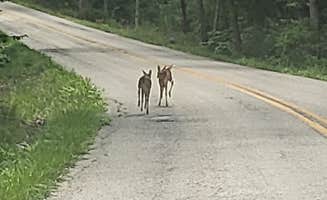Daniel Boone National Forest White Sulphur Horse Camp sits in Salt Lick, Kentucky at an elevation of approximately 800 feet. The campground operates on a first-come, first-served basis with no reservation system, making it suitable for trail riders with flexible schedules. Limited cell service exists for Verizon and AT&T users, typically providing just enough connectivity for occasional text messages but not consistent data usage.
What to do
Trail riding on horseback: Access the extensive network of equestrian trails directly from White Sulphur Horse Camp. The campground connects to designated horse trails throughout Daniel Boone National Forest, providing riders with varied terrain options. "We try and use horse camps when traveling in larger groups since they have more space," notes John, who appreciated the campground's layout.
Kayaking on the Licking River: Paddle the gentle waters near The Ole Cornfield campground, which offers both kayak rentals and shuttle service if you bring your own equipment. "They shuttle you up to the dam and it takes a couple of hours to get back down to their campground," shares Karen P., adding that "Justin pulls your kayaks out and takes them up the hill for you, which is great for this old woman."
Off-road adventures: Explore the trail system at S-Tree Campground, which caters to off-road enthusiasts with multiple trails. "S Tree campground in McKee KY is great for trail riding! Multiple trials to venture on," explains Wayne H., while another camper notes that it's a "riders paradise" with generous campsite sizes.
What campers like
Spacious equestrian sites: Horse campgrounds typically offer more room than standard sites, making them ideal even for non-equestrian groups. At White Sulphur Horse Camp, one visitor mentioned that "Since we didn't have horses I can't speak entirely on how well the horse amenities are but the place was clean, restroom facilities were stocked with TP."
Riverside camping: Lago Linda Hideaway offers peaceful waterfront sites with natural swimming opportunities. "Our site was spacious and pretty, with plenty of room for our two tents and a hammock," shares Lena L., while another camper noted they "took a dip in the lake" during warmer weather.
Well-maintained facilities: Despite their rustic nature, many equestrian campgrounds in the area maintain clean facilities. "Bathrooms were clean. Campsite was clean. Campground very well maintained," reports Amy K. about S-Tree Campground, while another visitor found the restroom facilities at White Sulphur "were stocked with TP."
What you should know
Primitive amenities: Most horse camps offer basic facilities only. White Sulphur provides vault toilets and trash collection but lacks drinking water, electric hookups, and showers. Campers should bring all necessary water supplies and equipment for primitive camping.
Weather considerations: The Slade area experiences distinct seasons with potentially challenging conditions. "It rained every day, a lot," shared one camper at Twin Knobs Recreation Area, though they noted their "campsite drained the rain off really well" thanks to proper site preparation and gravel surfaces.
Access roads: Some horse campgrounds have limited access for larger vehicles. "The northern road in isn't all that bad, but the south road is what I NEEDED to use to get to my various destinations, and it was a rough one," explains Andrew G. about S-Tree Campground, noting he "was bottoming out on gravel" in a smaller vehicle.
Ticks and insects: Be prepared for potential pest encounters. One Lago Linda camper warned, "we found a few lone star ticks on our dog. Just as a heads up to campers. Always do your tick checks!"
Tips for camping with families
River wading: Shallow water areas provide safe places for children to explore. "The grandkids love to play in the river, which is about 1 to 2 feet deep at this location. Great for wading and catching minnows, crawdads, and such," shares Karen P. about The Ole Cornfield.
Wildlife observation: Turn camping into a nature education opportunity with catch-and-release activities. "Frog hunting (catch and release)" was highlighted as a fun family activity by Karen P., who appreciated the natural setting for children to learn about local ecosystems.
Pack extra supplies: Remote horse campgrounds typically have no stores nearby. One camper at Lago Linda noted the "camp owners were out, thus only the open field camping was available," suggesting facilities and services can be limited depending on staffing.
Tips from RVers
Site selection: Choose campgrounds with appropriate RV accommodations if bringing larger vehicles. "The area for RV's is a little tight in the trees and probably won't accommodate an extremely large vehicle," cautions Heather K. about Lago Linda, though she notes "there is a huge open field on further into the camp that should be fairly easy to turn around in."
Electric hookups: Many horse camps lack electrical connections. The Ole Cornfield offers a good alternative with "water and electric at each site" according to Karen P., who appreciated this convenience while still enjoying proximity to equestrian trails.
Water availability: Plan for limited water access at primitive horse camps. "I had to carry water from about 500 or 600 ft away," reports one camper at Twin Knobs, highlighting the need to bring additional water containers for longer stays.


